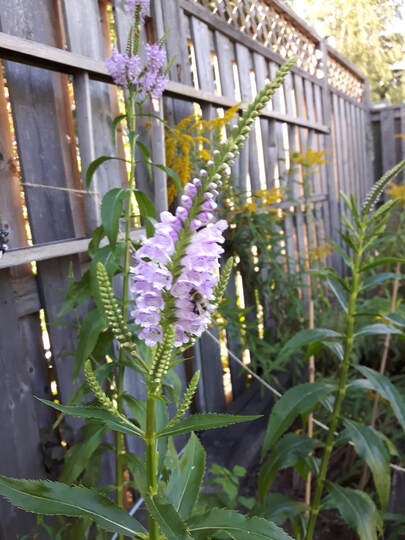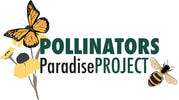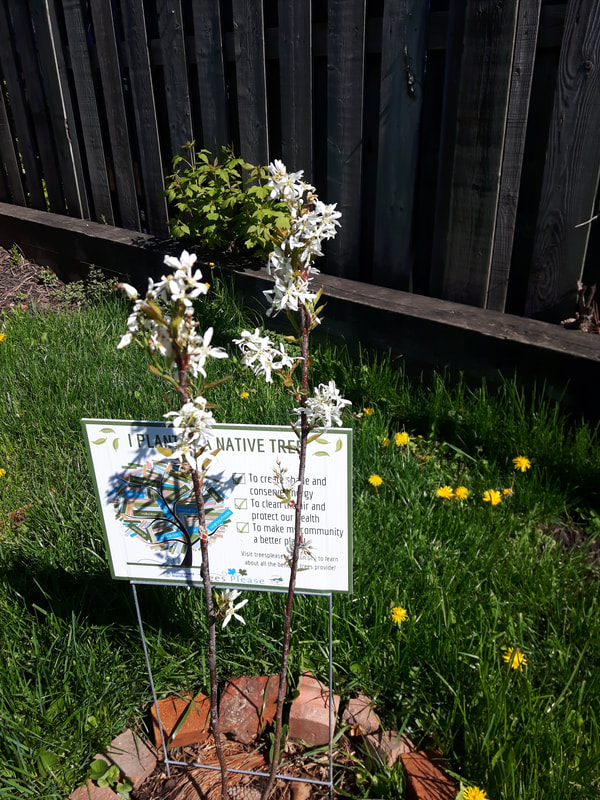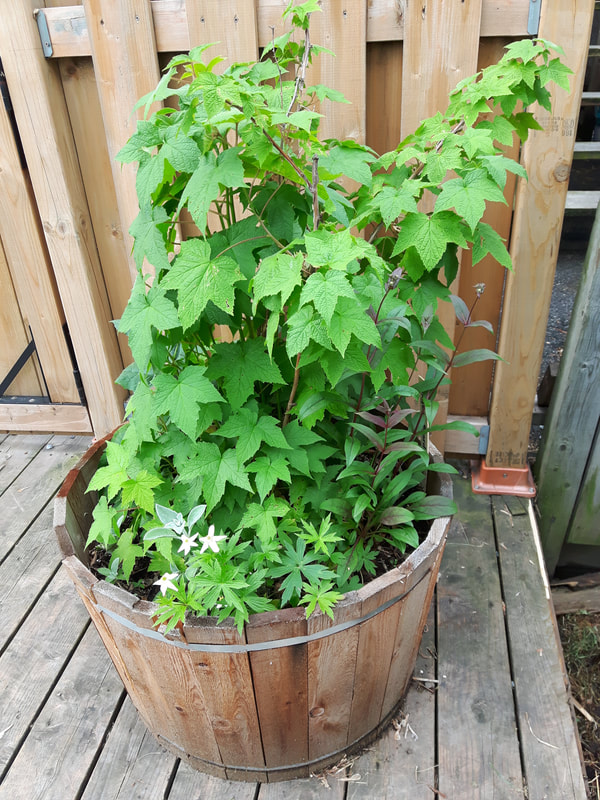|
Laurie Brady, Caterpillar Award Winner, 2019 . The Caterpillar Awards are a subset of the Hamilton Monarch Awards, awards of excellence for gardeners who garden in support of nature. To apply for either award in 2020, click here. Deadline is June 21. Laurie Brady moved to Hamilton three years ago from Ottawa. With her dogs Harry and Teddy, she enjoys exploring her new Kirkendall neighbourhood for historical heritage buildings (her background is in this field) which is how she first spotted our Pollinator Paradise “We are Feeding Pollinators” signs in the various gardens and at the Unitarian Church on Dundurn. “I thought that was pretty cool. I decided to learn more about the project, and subsequently, the Monarch and Caterpillar Awards” she recalls. As a renter, Laurie says she wanted to garden with minimal expense, water usage, and upkeep. “I've been cultivating a native garden in an economical way, taking advantage of local plants, rain barrel and compost sales, or transplants from my parents' pollinator garden.” Laurie dug up Goldenrod plants from the alley behind the fence; “I saved them before a well-intentioned neighbour mowed ‘the weeds’ down.” The previous owner did not garden, and the beds which might be 20-30 years old were full of old dyed mulch or overgrown with invasive species: Common Buckthorn, Garlic Mustard, Star of Bethlehem, Periwinkle, Manitoba Maple, Tree of Heaven, Mulberry: “it was a lot of work hauling those out and improving the clay soil,” she says. Laurie has added a bee hotel, bird bath, and made a shallow bee and butterfly bath out of terracotta; “The dogs ares happy to be out in the yard now,” she laughs. Laurie is thrilled at the level of support there is in the community for gardening that benefits nature: “it’s amazing! Hamilton has great programs, such as the free Street Trees program, and compost giveaway in the Spring and the various native plants’ sale.” She says she also makes use of the many online resources, as well as volunteer experts. “One of the Monarch Awards’ judges explained to me that pollinator seed mixes are not really that good, as often, they do not actually have a high native species content. As well, I have learned a lot through the pollinator Paradise Project’s website, Carolinian Canada, and local experts Joanne Tunnicliffe.”  Phlox transplanted from Laurie's parents' garden --with resident swallowtail. Phlox transplanted from Laurie's parents' garden --with resident swallowtail. Next steps for Laurie’s garden? “Currently, my garden is more about what's not here since I started working on it in June 2018,” Laurie says. “My young transplants have been busy sending out roots & shoots, and I'm thrilled to see how much they've grown. I'm curious to see if the butterfly and common milkweed seeds I sowed last fall will grow. Laurie’s big undertaking this spring is to build a hugelkultur (raised bed garden) for fruits and veggies. Ecologist, Charlie Briggs, one of the Monarch Awards and Caterpillar Awards’ judges, mentioned on his visit to her garden, last year that rather than introducing garden soil, it's better to improve what's already in the yard. Laurie has noted that many of her neighbours have the big green, yellow, or red bags of garden soil delivered by the cubic metre or yard to start veggie gardens. “Rather than spend money on lumber and soil to build a veggie bed, I'd need little to build a hugelkultur bed, which would conserve water too,” she says. Parting words from Laurie: “At least we are still allowed outside to do gardening during the pandemic. Parents are looking for things to do with their kids--even planting seeds in a pot is good, and you can order these online. And don’t forget to get your native species garden on the Hamilton Pollinator Paradise map!”
5 Comments
9/11/2020 08:33:13 pm
I like your views about Biodiversity which is explaining the verity of life. Different creations are living on this earth and Allah is the owner of all creations who is providing the food to everything which is alive on the earth and under the earth.
Reply
1/31/2022 02:45:59 am
It's good to be informed about the conference. During the conference, you may gain a lot of useful information, and the best part is that you can interact with a lot of academic scholars.
Reply
10/9/2022 11:42:35 pm
If you want to have an expert service by staying within your budget then choosing specialist assistance of the Academic Helpers for all your essays, assignments and dissertations is a good idea.<a href="https://bestassignments.com/services/dissertation-help"> Dissertation Writing </a>
Reply
10/23/2022 11:55:12 pm
If you want to have an expert service by staying within your budget then choosing specialist assistance of the Academic Helpers for all your essays, assignments and dissertations is a good idea.<a href="https://bestassignments.com/services/dissertation-help"> Dissertation Writing </a>
Reply
Leave a Reply. |
Archives
December 2023
Categories |
|
|
Butterflyway Hamilton: www.facebook.com/butterflywayhamilton/
Environment Hamilton: https://www.environmenthamilton.org/ Hamilton Naturalists' Club: https://hamiltonnature.org/ |




 RSS Feed
RSS Feed